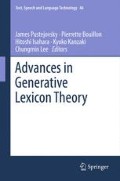Abstract
Although there is a clear requirement for generative devices in the lexicon, there are limits to productivity, which must be accounted for. This article provides an overview of several different classes of semi-productivity, including both lexical and phrasal examples. A probabilistic approach is outlined.
Access this chapter
Tax calculation will be finalised at checkout
Purchases are for personal use only
Notes
- 1.
Verspoor also notes that nouns like story and song occur with begin and finish in the sense of tell/perform. However, these might alternatively be classified as agentive. The data is also complicated because Verspoor excludes eventive nouns in her definition of metonymy, and while this distinction may be justified, it is a little hard to make precise. Her comparison with other verbs also raises interesting issues. For my current purposes, however, all that matters are the limitations on the use of begin and finish with nouns denoting physical objects or substances, since this is not predicted on a fully productive account of metonymy.
- 2.
Although this concept has been discussed in the literature, there doesn’t appear to be any standard terminology: the term anti-collocation is taken from Pearce (2001).
- 3.
The phrase heavy eater is not found in the BNC: heavy eaters occurs once, but in a context referring to plants.
- 4.
Notice that the non-compositional adjective-noun multiword expressions tend not to occur in predicative form. Adjectives applying to the event in a deverbal noun are also not found predicatively, in general: the smoker is heavy and the teacher is French only have the reading where the adjective applies directly to the individual.
References
Aronoff, M. (1976). Word formation in generative grammar (Linguistic inquiry monograph 1). Cambridge, MA: MIT Press.
Bauer, L. (1983). English word-formation. Cambridge: Cambridge University Press.
Briscoe, E. J., & Copestake, A. (1999). Lexical rules in constraint-based grammars. Computational Linguistics, 25(4), 487–526.
Clark, E. V., & Clark, H. H. (1979). When nouns surface as verbs. Language, 55, 767–811.
Copestake, A., & Briscoe E. J. (1996). Controlling the application of lexical rules. In Proceedings of the SIGLEX workshop on breadth and depth of semantic lexicons (pp. 7–19), Santa Cruz, CA.
Copestake, A., & Flickinger. D. (2000). An open-source grammar development environment and broad-coverage English grammar using HPSG. In Proceedings of the second conference on language resources and evaluation (LREC-2000), Athens, Greece.
Copestake, A., & Lascarides, A. (1997). Integrating symbolic and statistical representations: The lexicon-pragmatics interface. In Proceedings of the 35th annual meeting of the Association for Computational Linguistics and 8th conference of the European Chapter of the Association for Computational Linguistics (ACL-EACL 97, pp 136–143), Madrid.
Cruse, D. A. (1986). Lexical semantics. Cambridge: Cambridge University Press.
Downing, P. (1977). On the creation and use of English compound nouns. Language, 53(4), 810–842.
Fellbaum, C. (Ed.). (1998). WordNet: An electronic lexical database. Cambridge, MA: MIT Press.
Godard, D., & Jayez. J. (1993). Towards a proper treatment of coercion phenomena. In Proceedings of the sixth conference of the European Chapter of the Association for Computational Linguistics (EACL-93, pp. 168–177), Utrecht, The Netherlands.
Goldberg, A. (1995). Constructions. Chicago: Chicago University Press.
Hobbs, J., Stickel, M., Appelt, D., & Martin, P. (1993). Interpretation as abduction. Artificial Intelligence, 63(1), 69–142.
Mel’čuk, I., & Polguère, M. (1987). A formal lexicon in meaning-text theory (or how to do lexica with words). Computational Linguistics, 13(3–4), 261–275.
Nunberg, G. D. (1978). The pragmatics of reference. Doctoral dissertation, CUNY Graduate Center, reproduced by the Indiana University Linguistics Club.
Ostler, N., & Atkins, B. T. S. (1992). Predictable meaning shift: Some linguistic properties of lexical implication rules. Lexical semantics and knowledge representation. In J. Pustejovsky & S. Bergler (Eds.), Proceedings of the first SIGLEX workshop, Berkeley, CA (pp. 87–100). Berlin: Springer.
Pearce, D. (2001). Using conceptual similarity for collocation extraction. In Proceedings of the Fourth annual CLUK colloquium, Sheffield, UK.
Pinker, S. (1989). Learnability and cognition: The acquisition of argument structure. Cambridge, MA: MIT Press.
Pustejovsky, J. (1995). The generative lexicon. Cambridge, MA: MIT Press.
Pustejovsky, J., & Bouillon, P. (1995). Aspectual coercion and logical polysemy. Journal of Semantics, 12(2), 133–162.
Sag, I. A., Baldwin. T., Bond. F., Copestake. A., & Flickinger, D. (2002). Multiword expressions: A pain in the neck for NLP. In Proceedings of the third international conference on intelligent text processing and computational linguistics (CICLING 2002, pp. 1–15), Mexico City, Mexico.
Verspoor, C. M. (1997). Contextually-dependent lexical semantics. PhD thesis, Centre for Cognitive Science, University of Edinburgh.
Acknowledgements
This paper is based on an earlier work published in the proceedings of the 1st International Workshop on Generative Approaches to the Lexicon in 2001, but it also includes some material presented at the 3rd Workshop in 2005. I am grateful to the audiences at both events for their feedback and also to the other colleagues who commented on the earlier paper. I am especially grateful to Ted Briscoe and Simone Teufel for their detailed comments on this version. As usual, all mistakes are the responsibility of the author.
Author information
Authors and Affiliations
Corresponding author
Editor information
Editors and Affiliations
Rights and permissions
Copyright information
© 2013 Springer Science+Business Media Dordrecht
About this chapter
Cite this chapter
Copestake, A. (2013). The Semi-generative Lexicon: Limits on Productivity. In: Pustejovsky, J., Bouillon, P., Isahara, H., Kanzaki, K., Lee, C. (eds) Advances in Generative Lexicon Theory. Text, Speech and Language Technology, vol 46. Springer, Dordrecht. https://doi.org/10.1007/978-94-007-5189-7_20
Download citation
DOI: https://doi.org/10.1007/978-94-007-5189-7_20
Published:
Publisher Name: Springer, Dordrecht
Print ISBN: 978-94-007-5188-0
Online ISBN: 978-94-007-5189-7
eBook Packages: Computer ScienceComputer Science (R0)

